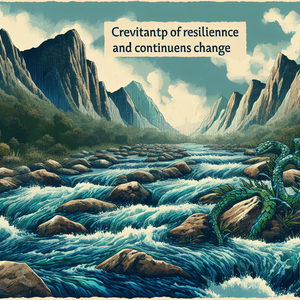From Rocks to Riches: How Geologists Can Transition into Lucrative Careers in the Renewable Energy Sector

The renewable energy sector is expanding rapidly, driven by ambitious global climate targets and the need to reduce reliance on fossil fuels. According to the International Energy Agency (IEA), renewable energy will account for nearly 90% of global electricity capacity growth by 2030. This growth is creating a significant demand for professionals with specialized knowledge of Earth’s systems and resources. Geologists, often associated with industries like oil and gas or traditional mining, possess a unique skill set that is now more relevant than ever. Their expertise in subsurface analysis, resource evaluation, and environmental impact assessments transfers seamlessly to renewable energy applications. For geologists, the shift to renewable energy is not just a career pivot—it’s a chance to contribute to a cleaner, more sustainable future while enjoying financial and professional rewards.
Geothermal Energy: Harnessing Earth's Heat
One of the most promising sectors for geologists in renewable energy is geothermal energy. This clean energy source relies on capturing heat from beneath the Earth's surface to generate electricity or provide direct heating. Geologists are critical to the geothermal process, as they are responsible for identifying and evaluating geothermal reservoirs, mapping subsurface heat sources, and determining the feasibility of geothermal projects. For example, Iceland, a global leader in geothermal energy, relies heavily on geological expertise to power its homes and industries. Geologists working in this field apply their seismic interpretation and rock permeability skills to locate geothermal hotspots. Additionally, they collaborate with engineers and policymakers to ensure projects are both economically viable and environmentally sustainable. Geothermal energy offers geologists not only financial rewards but also an opportunity to play a pivotal role in reducing greenhouse gas emissions.
Carbon Capture and Storage: Fighting Climate Change
Another high-potential area for geologists is carbon capture and storage (CCS). This technology involves capturing carbon dioxide (CO2) emissions from industrial sources and safely storing them underground in geological formations like depleted oil and gas reservoirs or deep saline aquifers. CCS is emerging as a vital tool in global efforts to achieve net-zero carbon emissions. Geologists are indispensable in CCS projects. Their expertise in stratigraphy, hydrogeology, and rock mechanics enables them to identify suitable storage sites, model CO2 movement underground, and assess long-term storage risks. For instance, the Sleipner CCS project in Norway has safely stored over 16 million tons of CO2 since its inception, with geologists playing a central role in its success. As governments and corporations invest heavily in CCS to meet climate targets, this field represents a lucrative and impactful opportunity for geologists.
Lithium Mining: Fueling the Clean Energy Revolution
The transition to electric vehicles (EVs) and renewable energy storage has sparked unprecedented demand for lithium, a critical component of rechargeable batteries. Geologists are at the forefront of this battery revolution, using their skills to locate and evaluate lithium deposits in both hard rock sources like spodumene and brine reservoirs in salt flats. Countries like Australia, Chile, and Argentina dominate the lithium market, with geologists playing key roles in exploration and extraction. For instance, Chile’s Salar de Atacama, one of the world’s largest lithium reserves, relies on geological expertise to meet the growing demand from EV manufacturers like Tesla. Geologists in this field are also tasked with ensuring sustainable extraction practices, balancing economic growth with environmental stewardship. With the global battery market projected to grow exponentially, lithium mining offers geologists a financially rewarding and future-proof career path.
Transferable Skills: Making the Leap
For geologists contemplating a career move into renewable energy, the good news is that much of their existing skill set is directly applicable to the green energy sector. Core competencies such as: - Data Analysis and Modeling: Geologists’ ability to analyze seismic data, geological maps, and subsurface conditions is highly valuable in renewable energy projects. - Environmental Impact Assessment: Expertise in evaluating environmental risks and adhering to regulations is crucial for sustainable energy development. - Problem-Solving: Geologists are trained to tackle complex challenges, from resource exploration to operational optimization. - Collaboration: Working in multidisciplinary teams is second nature to geologists, making them well-suited to collaborative renewable energy projects. To further enhance their employability, geologists can pursue additional certifications or training in renewable energy technologies, project management, or software tools like GIS (Geographic Information Systems) and 3D modeling. Many universities and organizations now offer short courses and workshops tailored to professionals transitioning into the green energy field.
Real-World Success Stories: Inspiration for Transition
Many geologists have already successfully transitioned into renewable energy careers, proving that the leap is not only possible but also highly rewarding. Consider Sarah, a former petroleum geologist who now works in geothermal energy exploration. Using her expertise in subsurface mapping, Sarah identifies viable geothermal reservoirs and contributes to clean energy development. Similarly, Michael, once focused on coal mining, pivoted to lithium exploration and now leads sustainable extraction projects in Australia. These stories underscore the adaptability of geologists and the growing demand for their skills. By embracing change and leveraging their expertise, geologists can secure fulfilling careers while making a meaningful impact on the planet.
What Should You Do Next?
If you’re a geologist facing uncertainty—perhaps after being laid off from a role at the U.S. Geological Survey or experiencing stagnation in traditional industries—the renewable energy sector offers a clear path forward. Start by identifying which renewable energy field aligns with your interests and skills. Consider enrolling in short courses or gaining certifications to bolster your qualifications. Networking with professionals already in the green energy space can also provide valuable insights and open doors to new opportunities. It’s important to remember that the renewable energy sector is not just a job market; it’s a mission. By transitioning into this field, you’re not only advancing your career but also contributing to one of the most critical global challenges of our time—building a sustainable future.
The renewable energy sector is a dynamic, fast-growing industry that is reshaping the global economy. For geologists, this sector offers a remarkable opportunity to transition from traditional roles to impactful careers in areas like geothermal energy, carbon capture and storage, and lithium mining. With their expertise in Earth’s processes and resources, geologists are uniquely qualified to lead the charge in the green energy revolution. By embracing this transition, geologists can unlock financial rewards, professional growth, and the satisfaction of contributing to a cleaner, greener planet. The shift from "rocks to riches" is more than just a career change—it’s a chance to shape the future. For those ready to take the leap, the renewable energy sector awaits with open arms.
Geothermal Energy Specialist
Ormat Technologies, Enel Green Power, and government energy agencies
Core Responsibilities
Conduct subsurface mapping and analysis to identify geothermal reservoirs and assess their potential for energy production.
Collaborate with engineers to design and implement geothermal energy extraction systems.
Perform feasibility studies, including economic viability and environmental impact assessments.
Required Skills
Proficiency in seismic data interpretation, hydrogeology, and rock permeability analysis.
Experience with Geographic Information Systems (GIS) and 3D modeling tools.
Carbon Storage Geologist (CCS Specialist)
Shell, TotalEnergies, and specialized CCS firms like Carbon Engineering
Core Responsibilities
Identify and evaluate geological formations, such as saline aquifers and depleted oil fields, for safe and long-term CO2 storage.
Model and monitor CO2 injection and movement in subsurface reservoirs to ensure containment integrity.
Assess risks associated with storage, including potential leakage and seismic activity.
Required Skills
Strong background in stratigraphy, sedimentology, and rock mechanics.
Familiarity with carbon storage simulation software like Petrel or Eclipse.
Lithium Exploration Geologist
Albemarle, SQM, Rio Tinto, and Tesla (for in-house resource teams)
Core Responsibilities
Conduct exploration projects to locate and assess lithium-rich deposits in hard rock (spodumene) or brine reservoirs (salt flats).
Analyze geochemical and geophysical data to determine the quality and quantity of lithium reserves.
Oversee drilling operations and ensure sustainable extraction practices.
Required Skills
Expertise in geochemistry, mineralogy, and resource evaluation techniques.
Knowledge of global lithium markets and environmental regulations for mining operations.
Renewable Energy Environmental Consultant
ERM (Environmental Resources Management), AECOM, and renewable energy developers
Core Responsibilities
Conduct environmental impact assessments for renewable energy projects, including wind farms, solar plants, and geothermal sites.
Develop strategies to mitigate ecological risks and ensure compliance with environmental regulations.
Work closely with project developers, engineers, and government agencies to secure permits and approvals.
Required Skills
Strong knowledge of environmental laws, sustainability practices, and renewable energy technologies.
Experience with environmental modeling and reporting tools (e.g., EIA software).
Hydrogeologist for Renewable Energy Projects
Jacobs, Wood Group, and government water resource agencies
Core Responsibilities
Assess groundwater resources and their interaction with renewable energy projects, such as geothermal systems or solar farms.
Monitor aquifer conditions and develop water management strategies to support sustainable energy development.
Conduct hydrological modeling to predict the impact of energy projects on local water resources.
Required Skills
Expertise in hydrogeology, water resource management, and hydrological modeling software (e.g., MODFLOW).
Familiarity with renewable energy applications and environmental compliance standards.


